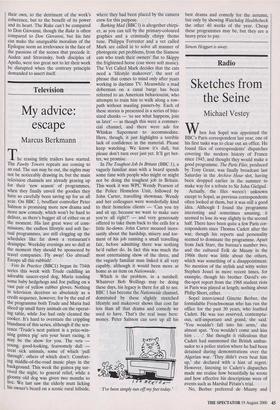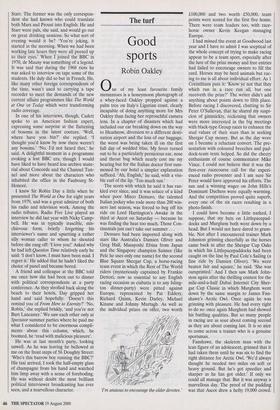Radio
Sketches from the Seine
Michael Vestey
When Jon Sopel was appointed the BBC's Paris correspondent last year, one of his first tasks was to clear out an office. He found files of correspondents' dispatches covering the modern history of France since 1945, and thought they would make a good programme. The Paris Files, produced by Tony Grant, was finally broadcast last Saturday in the Archive Hour slot, having been dropped earlier in the summer to make way for a tribute to Sir John Gielgud.
Actually, the files weren't unknown except to Sopel, as previous correspondents often looked at them, but it was still a good idea. Although I found the programme interesting and sometimes amusing, it seemed to lose its way slightly in the second half. There have been quite a few Paris cor- respondents since Thomas Cadett after the war, though his reports and personality seemed to dominate the programme. Apart from Jack Starr, the bureau's number two, and the cultured Erik de Mauny in the 1960s there was little about the others, which was something of a disappointment. No mention of the stylish and witty writer Stephen Jessel in more recent times, for example, though his brother David's on- the-spot report from the 1968 student riots in Paris was played at length; nothing about Philip Short, either.
Sopel interviewed Ginette Berber, the formidable Frenchwoman who has run the office for the past 30 years, who loathed Cadett. He was too reserved, contemptu- ous, self-important and grand, she said. `You wouldn't fall into his arms,' she almost spat. 'You wouldn't come and kiss him . . .' She thought it ridiculous that Cadett had summoned the British ambas- sador to a police station where he had been detained during demonstrations over the Algerian war. 'They didn't even beat him up,' she declared with a hint of regret. However, listening to Cadett's dispatches made me realise how beautifully he wrote and how effective his descriptions were of events such as Marshal Petain's trial.
No, Berber preferred de Mauny and Starr. The former was the only correspon- dent she had known who could translate both Marx and Proust into English. He and Starr were pals, she said, and would go out on great drinking sessions. So what sort of evening would it be? 'You're joking, it started in the morning. When we had been working late hours they were all peesed up to their eyes.' When I joined the BBC in 1970, de Mauny was something of a legend. It was said that during the 1968 riots he was asked to interview on tape some of the students. He duly did so but in French. He, like many other foreign correspondents of the time, wasn't used to carrying a tape recorder to meet the demands of the new current affairs programmes like The World at One or Today which were transforming radio coverage.
In one of his interviews, though, Cadett spoke to an American fashion expert, expressing some surprise at the flattening of bosoms in the latest couture. 'Well, where have you bin?' she replied. 'I thought you'd know by now there weren't any bosoms."No, I'd not heard thet,' he said. A delightful moment in a programme evoking a lost BBC era, though I would have liked to have heard less archive mate- rial about Concorde and the Channel Tun- nel and more about the characters who inhabited the office in the Faubourg St- Honore.
I knew Sir Robin Day a little when he presented The World at One for eight years from 1979, and was a great admirer of both his radio and television work. Among the radio tributes, Radio Five Live played an interview he did last year with Nicky Camp- bell. He was in typically irascible, mis- chievous form, briefly forgetting his interviewer's name and upsetting a rather silly woman caller to whom he shouted before she rang off: 'I love you!' Asked why he had left Question Time relatively early he said: 'I don't know, I must have been mad. I regret it.' He added that he hadn't liked the choice of panel and became bored.
A friend and colleague at the BBC told me once how she had been out to dinner with political correspondents at a party conference. As they strolled back along the beach to their hotels, Day gripped her hand and said hopefully: 'Doesn't this remind you of From Here to Etemity?"No, Robin,' she replied briskly, 'and you're not Burt Lancaster.' We saw each other only at Spectator summer parties where he paid me what I considered to be enormous compli- ments about this column, which, he boomed, he 'read with malicious pleasure'.
He was at last month's party, looking unwell. As he was leaving he bellowed at me on the front steps of 56 Doughty Street: `Who's this barrow boy running the BBC?' His taxi arrived, I took the half-empty glass of champagne from his hand and watched him limp away with a sense of foreboding. He was without doubt the most brilliant political interviewer broadcasting has ever seen, and a marvellous character.



























































 Previous page
Previous page